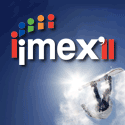
news
Get More from Events
Anthony Miller from Active Network explains how event organisers can gain greater ROI. (New feature in the Eventia newsletter - as featured in the November issue).
With all aspects of marketing under ever closer scrutiny from the finance department, event marketers must work harder than ever to demonstrate that events can deliver a realistic return on investment. The events industry increasingly needs to prove its worth and so must introduce measurable, industry-wide standards against which event success and ROI can be evaluated. Technology is undoubtedly playing a vital new role here. I.T. can capture data to help event organisers to measure and manage events to a far greater potential and deepen relationships over far longer periods than previously possible.
Get More from Events
Marketing disciplines that are not able to measure their activities are at a distinct disadvantage compared to those that can. Advertisers can, direct marketers can. The events industry is arguably behind and must raise its game to ensure companies continue to invest in events rather than spending their budget on other, traditionally more measurable, marketing tools.
But what to measure? And how?
Acronyms such as ROI (return on investment), ROO (return on objectives), ROMI (return on marketing investment) have crept inexorably into contemporary marketing lexicon and, although most of us appreciate the intrinsic meaning of each acronym, not everyone understands how best to make use of them.
The events industry underestimates the importance of good, everyday, event evaluation. A sentiment shared by the Event ROI Institute who has carried out extensive research on the subject. With increased scrutiny on budgets, this lack of measurement forces organisations to question the value of face to face events, especially when budgets are being slashed. Marketing is an easy target and events within that an even easier target unless you can demonstrate and prove the impact on sales or employee productivity or retention.
The events industry can no longer rely on ‘hygiene’ factors – what people think or feel – or delivering an event ‘in budget’ as its measure of success. (In reality, hygiene factors have little to do with business). When measured correctly, face-to-face events have been proven to be the most effective means of engaging an audience, and its time to shout about this marketing disciplines’ effectiveness and no longer be shy about it. Surely one of the best ways to help the events industry win a greater share of the marketing pot would be to develop and agree measurable standards across the industry. Measurement should also be on the agenda from the initial stages of planning an event.
Event marketers must make sure that for every event they have a list of specific and measurable actions that they want participants to take as a direct result of attending the event. Why are we holding the event and what do we want people to do as a result of attending it? This is the only known mechanism for creating value from any kind of event to be able to see how the event is going to return value to its stake holders, - the company who owns the event, the attendees, the speakers and the exhibitors/sponsors.
And applying the ROI methodology to an event is simple. First, have a set number of relevant and measurable objectives, then use standard (and proven) methods to collect data to see if the objectives were met.
Here’s a list of suggested event objectives
● Business Impact – how do you want the event to impact key business measures, such as sales or profit?
● Behaviour – what specific actions do you want participants to take as a result of attending e.g. visit a website, sign up to a mailing list?
● Learning – cognitive change always has to precede behavioural change to change behaviour i.e. participants have to ‘learn’ something – be it information, skills, attitudes and relationships. All aspects of every event will support at least one of these categories of learning
When we have set these objectives and planned and executed the event accordingly, we can measure results along the chain of impact: did we create a good learning environment? Did they learn something? Did they apply what they learned? And what was the business impact of their behaviour? By comparing the monetary value of the Business Impact with the cost of the event, we may calculate the event profit, which is the same as ROI. ROI is the net value created by the event as a percentage of the event cost.
Using technology to put the marketing back into event marketing
Technology is playing an increasingly important role to help event organisers measure and manage events to greater potential. For example, at Active Network we offer event-specific software that’s the modern version of the business card but infinitely more sophisticated. It can ‘fly-trap’ all essential data on to a barcode and release it back into the environment when the time is right, then trace its progress. The return on investment, then, can immediately be quantified.
I.T. can develop and deepen event attendee relationships over far longer periods than previously, as well as handling all the practical elements of events such as online registration, online communications and onsite networking.
Event ‘intelligence’ is just as important (if not more important) than event administration. Technology allows event organisers to capture key data from events, tracing each delegate’s unique journey before, during and after each event that can be passed to sales or HR and used to drive measurable results. Instead of guessing what people are interested in, we know and can create a specific action plan that’s individualised and targeted. Essentially we are putting the marketing back into event marketing.
ROI may not necessarily be monetary but could be anything from a returning attendee, to a sales confirmation, to increased productivity and services knowledge. Through technology we can narrow this down to tangible measurements such as the value of leads generated per exhibitor, per show. Yet, while we’re being encouraged not to over-stress about ROI and to examine other peripheral factors, it still plays a crucial role in contributing to stakeholder profits, delivering more value than it costs.
By utilising technology in a more strategic way, event organisers can generate better quality metrics and measurement data that can, in turn, be used to justify investment decisions that could see companies devoting a greater share of the marketing budget towards events than hitherto. Now that would be something!












